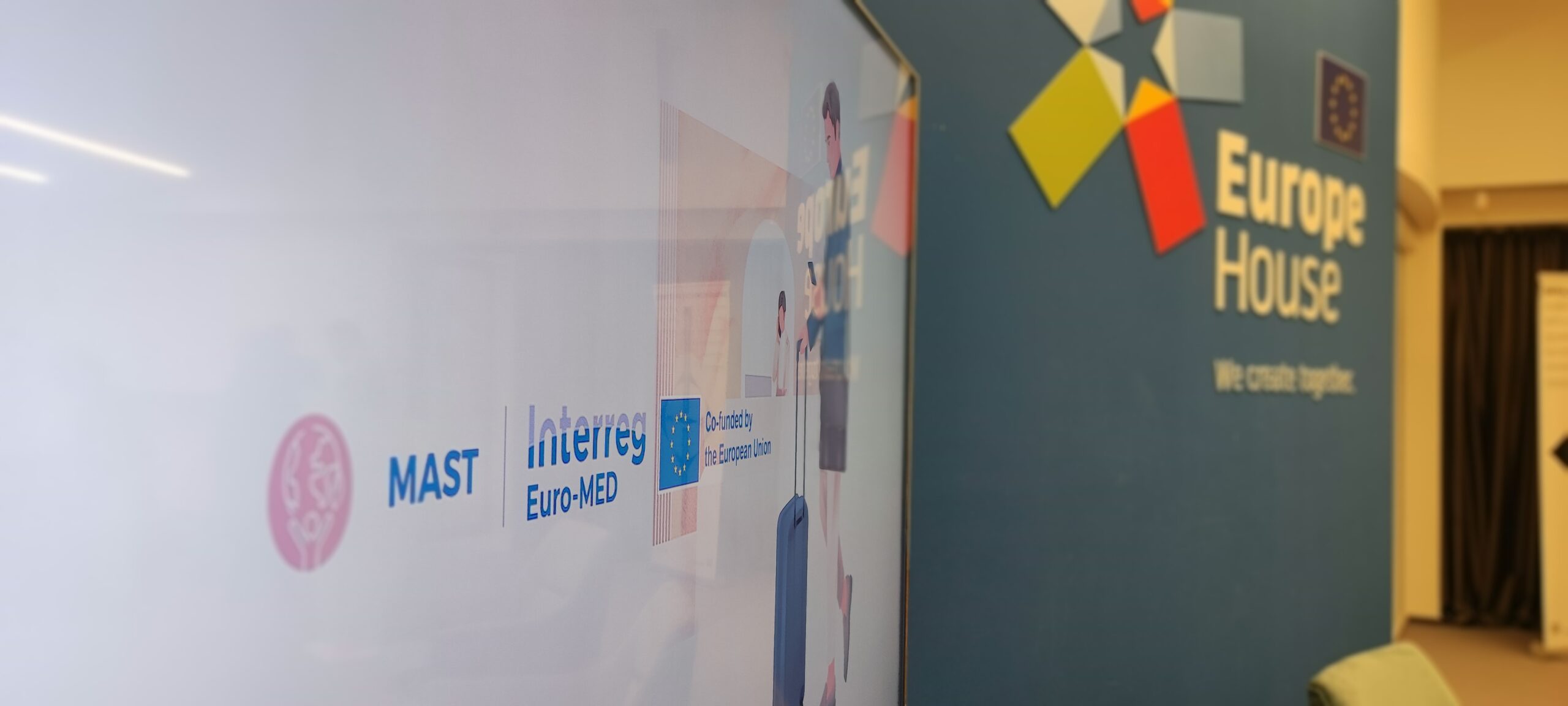Sarajevo, Bosnia and Herzegovina, 28 November 2024
In a dedicated effort to promote sustainable tourism, the Interreg Euro-MED MAST (MAking Sustainable Tourism possible) project organized a highly impactful Info Day and Stakeholder Event in Sarajevo. The event, which focused on sustainable practices in Bosnia and Herzegovina’s accommodation sector, attracted a diverse and engaged audience inspired by the MAST initiative.
The gathering featured renowned speakers from the MAST consortium, shedding light on the project’s objectives, the ISO 21401 standard for sustainable tourism, and notable examples of global and local best practices. The event was opened by Ms. Jana Čarkadžić, Director of Sarajevo Meeting of Cultures and a MAST consortium partner, who warmly welcomed participants. Following her speech, Mr. Faruk Čaluk, representing the Tourist Association of Sarajevo Canton, emphasized the broader importance of embedding sustainability measures across all tourism offerings.
Why Sustainability Matters
A central theme of the event was the growing imperative for sustainability in the accommodation sector. Research presented revealed that 92% of travelers prefer eco-conscious options, with platforms like Booking.com now prioritizing sustainable and certified properties in search rankings.
Participants were particularly intrigued by the example of Hotel Bertelli in Madonna di Campiglio, which excels in balancing guest satisfaction and sustainability through six key commitments. These include investing in staff development, adopting renewable energy, and promoting local gastronomy—all of which drive both ecological and economic benefits.
ISO 21401 Standard: A Roadmap to Sustainability
The MAST project’s innovative sustainability framework, created by Mediterranean experts, was highlighted as a guiding tool for SMEs. By leveraging a structured protocol and a self-assessment tool, the framework connects global standards like ISO 21401 with localized solutions.
The ISO 21401 standard outlines actionable steps for accommodation providers to reduce water and waste footprints, optimize supply chains, and foster community involvement. These measures ensure long-term environmental preservation and align with the project’s mission to transition the Mediterranean tourism sector towards circular and resilient management systems.
Global and Local Examples of Sustainability
Inspirational success stories demonstrated the tangible benefits of sustainable practices. Costa Navarino resort in Greece and Cactus Hotels in Crete illustrated how large-scale renewable energy use and authentic community engagement can lead to both profitability and environmental responsibility.
On a local scale, the Courtyard by Marriott Sarajevo emerged as a trailblazer. As the first hotel in Bosnia and Herzegovina to pursue Green Key Certification, the Marriott has implemented eco-friendly initiatives, including reducing plastic waste, tracking energy and water use, and partnering with local organizations for reforestation.
Other prominent hotel chains in Sarajevo, including Mövenpick Hotels and Rotana Sarajevo, also recognize the growing importance of sustainability. Both chains actively contribute to this effort, understanding the critical role of sustainable practices in attracting environmentally conscious clients and embedding these principles into their daily operations.
Towards a Sustainable Future
The Stakeholder Event underscored the transformative shift required within the tourism industry to achieve sustainability. The MAST project, now a cornerstone of this movement, continues to support Mediterranean SMEs with tools, strategies, and a vibrant network of partners. By addressing barriers and enabling knowledge-sharing, the project fosters a future where businesses can simultaneously preserve cultural heritage and drive economic growth.
Closing Remarks
The event concluded by highlighting the significance of Bosnia and Herzegovina’s participation in the MAST project, particularly in connecting SMEs with a vast European network of like-minded facilities. His closing remarks emphasized the importance of knowledge exchange and collaboration in shaping a sustainable future for the region.
The day concluded with a successful session, followed by the MAST consortium’s steering committee meeting.
Acknowledgments
Special thanks were extended to the MAST consortium’s partners and stakeholders, including the Tourist Association of Sarajevo Canton, Tourist Association of Srednja-Bosna Canton, and esteemed hotels such as Marriott Courtyard, Mövenpick, and Rotana Hotel, for their invaluable contributions.
For more information about the MAST project and its initiatives, follow our official MAST web page and social media channels.


